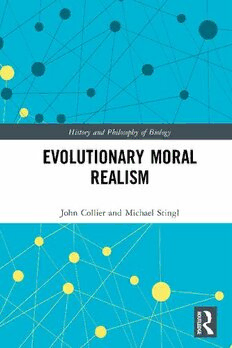
Evolutionary Moral Realism PDF
Preview Evolutionary Moral Realism
Evolutionary Moral Realism Against standard approaches to evolution and ethics, this book develops the idea that moral values may find their origin in regularly recurring features in the cooperative environments of species of organisms that are social and intelligent. Across a wide range of species that are social and intelligent, possibilities arise for helping others, responding empathetically to the needs of others, and playing fairly. The book identifies these underlying environmental regularities as biological natural kinds and as natural moral values. As natural kinds, moral values help to provide more complete explanations for the selection of traits that arise in response to them. For example, helping in an aquatic environment is quite different than helping in an arboreal environment, and so we can expect the selection of traits for helping to reflect these underlying environmental differences. With the human ability to name, talk, and reason about important features of our environment, moral values become part of moral discourse and argument, helping to produce coherent systems of moral thought. C ombining a naturalistic approach to morality with an equal emphasis on moral argument and truth, this book will be of interest to philosophers and historians of biology, theoretical biologists, comparative psychologists, and moral philosophers. John Collier (1950–2018) was Professor Emeritus at the University of KwaZulu- Natal, South Africa. Michael Stingl is Associate Professor of Philosophy at the University of Lethbridge, Canada. History and Philosophy of Biology Series Editor: Rasmus Grønfeldt Winther Associate Professor of Philosophy at the University of California, Santa Cruz (UCSC) This series explores significant developments in the life sciences from historical and philosophical perspectives. Historical episodes include Aristotelian biology, Greek and Islamic biology and medicine, Renaissance biology, natural history, Darwinian evolution, Nineteenth-century physiology and cell theory, Twentieth- century genetics, ecology, and systematics, and the biological theories and prac- tices of non-Western perspectives. Philosophical topics include individuality, reductionism and holism, fitness, levels of selection, mechanism and teleology, and the nature-nurture debates, as well as explanation, confirmation, inference, experiment, scientific practice, and models and theories vis-à-vis the biological sciences. Authors are also invited to inquire into the “and” of this series. How has, does, and will the history of biology impact philosophical understandings of life? How can philosophy help us analyze the historical contingency of, and structural con- straints on, scientific knowledge about biological processes and systems? In prob- ing the interweaving of history and philosophy of biology, scholarly investigation could usefully turn to values, power, and potential future uses and abuses of bio- logical knowledge. T he scientific scope of the series includes evolutionary theory, environmental sciences, genomics, molecular biology, systems biology, biotechnology, biomedi- cine, race and ethnicity, and sex and gender. These areas of the biological sciences are not silos, and tracking their impact on other sciences such as psychology, eco- nomics, and sociology, and the behavioral and human sciences more generally, is also within the purview of this series. Ecological Investigations A Phenomenology of Habitats Adam C. Konopka Evolutionary Moral Realism John Collier and Michael Stingl For more information about this series, please visit: www.routledge.com/ History-and-Philosophy-of-Biology/book-series/HAPB Koson, Mother and baby reaching for the reflection of the moon. Permission granted by the Arthur M. Sackler Gallery, Smithsonian Institution, Washington, DC, Robert O. Muller Collection. Evolutionary Moral Realism John Collier and Michael Stingl First published 2020 by Routledge 2 Park Square, Milton Park, Abingdon, Oxon OX14 4RN and by Routledge 52 Vanderbilt Avenue, New York, NY 10017 Routledge is an imprint of the Taylor & Francis Group, an informa business © 2020 John Collier and Michael Stingl The right of John Collier and Michael Stingl to be identified as authors of this work has been asserted by them in accordance with sections 77 and 78 of the Copyright, Designs and Patents Act 1988. All rights reserved. No part of this book may be reprinted or reproduced or utilised in any form or by any electronic, mechanical, or other means, now known or hereafter invented, including photocopying and recording, or in any information storage or retrieval system, without permission in writing from the publishers. Trademark notice: Product or corporate names may be trademarks or registered trademarks, and are used only for identification and explanation without intent to infringe. British Library Cataloguing-in-Publication Data A catalogue record for this book is available from the British Library Library of Congress Cataloging-in-Publication Data Names: Collier, John (Philosophy), author. | Stingl, Michael, 1955- author. Title: Evolutionary moral realism / John Collier and Michael Stingl. Description: Abingdon, Oxon ; New York, NY : Routledge, 2020. | Series: History and philosophy of biology | Includes bibliographical references and index. Identifiers: LCCN 2019039353 (print) | LCCN 2019039354 (ebook) | ISBN 9780367281304 (hbk) | ISBN 9780429299803 (ebk) Subjects: LCSH: Ethics. | Evolution (Biology) | Evolutionary developmental biology. Classification: LCC BJ58 .C65 2020 (print) | LCC BJ58 (ebook) | DDC 171/.7—dc23 LC record available at https://lccn.loc.gov/2019039353 LC ebook record available at https://lccn.loc.gov/2019039354 ISBN: 978-0-367-28130-4 (hbk) ISBN: 978-0-429-29980-3 (ebk) Typeset in Times New Roman by Apex CoVantage LLC In memory of John Contents About the authors x Acknowledgements xi Preface xiii 1 Evolutionary moral realism 1 2 The moon in the water 17 3 Moral trajectories 39 4 Moral sense theories 60 5 Reason, rational contracts, and selfish genes 83 6 Natural moral values and moral progress 109 7 Partial and impartial moral reasons 129 8 Moving from is to ought 144 Conclusion 167 Index 171
